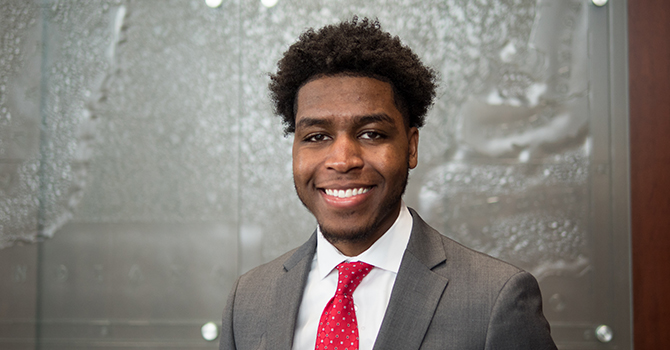Combining Advocacy, Policy, and Research to Make an Impact in Public Health

Julian Roby
MPH Candidate, Health Behavior and Health Education; Rachel G. Smylie Memorial Scholarship Recipient
There are policies from the 40s, 50s, and 60s - even though they've been outlawed since the 60s - that are still impacting communities today. My work asks how we can combat these things through public health and policy.
I came to Michigan Public Health because I was interested in youth violence and public health. In my work I explore themes of violence, residential segregation, and housing policy, specifically. I look at how neighborhoods were constructed in the 20th century, how they were maintained to continue segregation and violence, and how children, in particular, navigate concentrated areas of poverty, violence, and joblessness. There are policies from the 40s, 50s, and 60s - even though they've been outlawed since the 60s - that are still impacting communities today. My work asks how we can combat these things through public health and policy.
Last semester I got a chance to spend time in an Ohio neighborhood and learn about a community's needs from the people who live there. As part of my work with the Youth Violence Prevention Center, I participated in a study developing better community programs in Youngstown, Ohio. I spent time asking residents what they think about their neighborhoods, what they'd like to see there. It was a chance to learn about needs from the community's mouth, rather than determine their needs from afar, and a chance to get my feet on the ground and do outreach work. Justin Heinze and the YVPC are also doing work in Flint on mental health first aid, really trying to combat violence exposure and the school-to-prison pipeline.
Right now, I'm working with the Health Policy Student Association on gun control and suicide prevention. My team and I, "Student's For Firearm Safety," are advocating for a brief that will be presented to policy makers in Lansing. We're pitching to the left and the right, really trying to put our information and experience into action as public health and policy advocates. I focus on the suicide prevention side, specifically — on suicide prevention, mental health screenings for gun control, psychological exam limitations, and care for veterans with PTSD. We're not trying to prevent people from having guns, just make safer gun laws and address the underlying causes of gun violence. A big part of that is providing better care for veterans with high levels of PTSD.
Going forward, my main focus is on health policy. I want to crack it, and see how policy impacts peoples’ lives.
This summer I had my first experience studying abroad. Thanks to funding from the Rachel G. Smylie Memorial Scholarship at SPH and the Global Public Health Office, I traveled to Santiago, Chile for an internship at the Universdad del Desarrollo. With Dr. Jorge Varela, a University of Michigan Psychology and Public Health Prevention Research Center alumnus, and a team of clinical psychologists I worked on a school safety climate study. We used the experiences of students from 2,000 different schools to create a literature review that informed measurement analysis of adolescent dating violence in Chilean couples, and recommended better tools for assessing what's actually going on beyond the basic literature about domestic violence. I learned so much from Dr. Varela and his team about research and tools I now use with YVPC.
Public Health Students of African Descent (PHSAD) has been a really great asset for me here at the School of Public Health. It's made it possible for me to come together with public health students of color and learn about their experiences, and hear how they're navigating their programs and public health education every day. They also have a valuable mentoring program. My mentor is Dr. Ebbin Dotson, and he's been a spectacular resource, talking to me about growth opportunities and professional development. He's been a great mentor to me.
Last year I became a Child Health Specialist at Motts Children's Hospital to help children who are dealing with different health ailments. It was an opportunity for me to put my services to work and really help kids who are going through a tough time. I really looked forward to meeting the kids every week - being able to put a smile on their face. Sometimes that meant just playing Connect Four for a couple hours. That was enough to get them through a hard week. It was challenging, but I reminded myself that if I could make their lives a little bit better, even in small ways, I'm was doing an okay job.
Going forward, my main focus is on health policy. I want to crack it, and see how policy impacts peoples' lives. That's a little different than the traditional Health Behavior and Health Education student, but policy definitely dictates health and vice versa. I can be an agent for change in that area. In the future, I would like to use a combination of advocacy, policy, and research in public health - do research to inform a policy group to address social disparities around health. I would one day like to work for the CDC.
